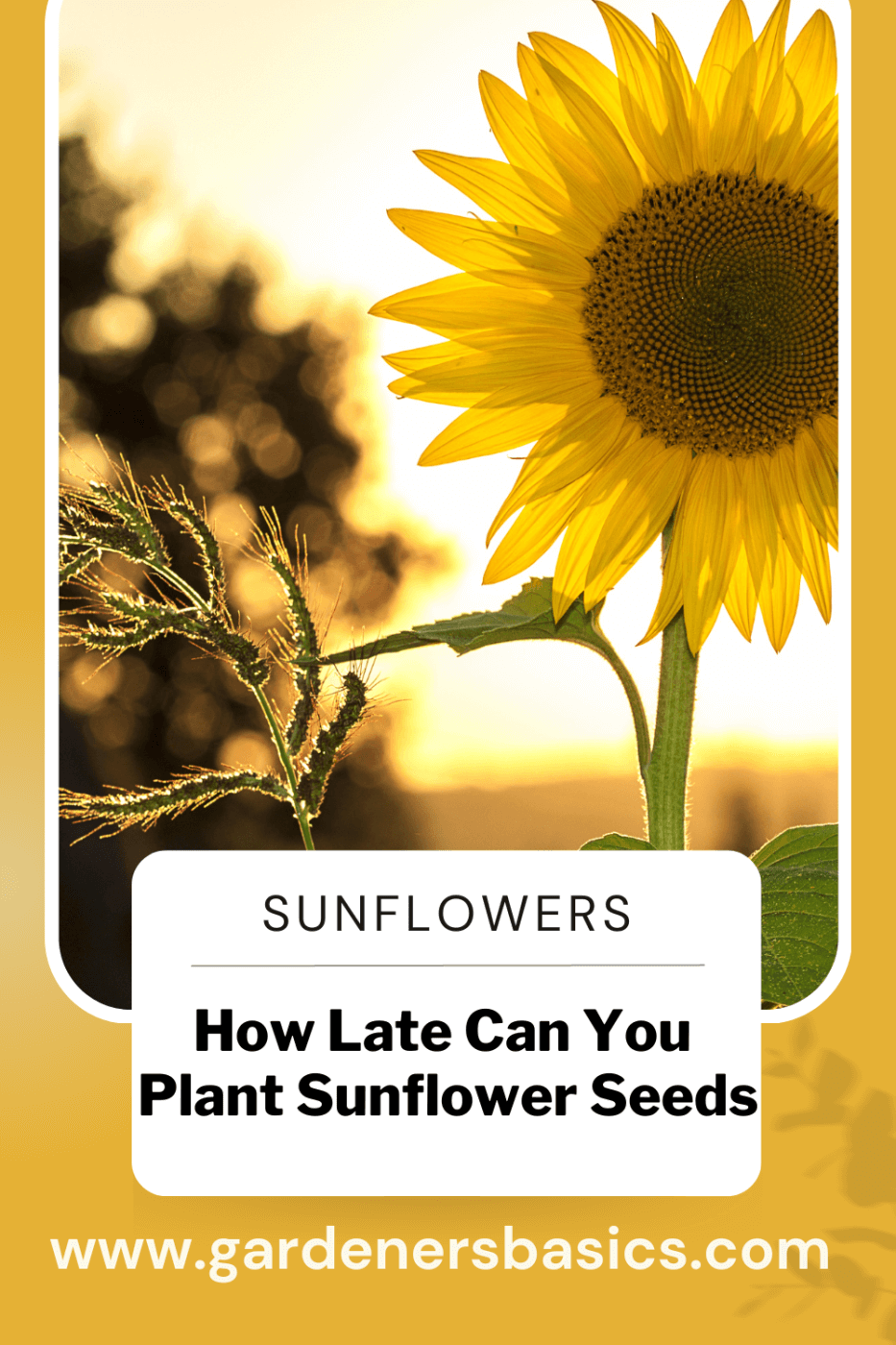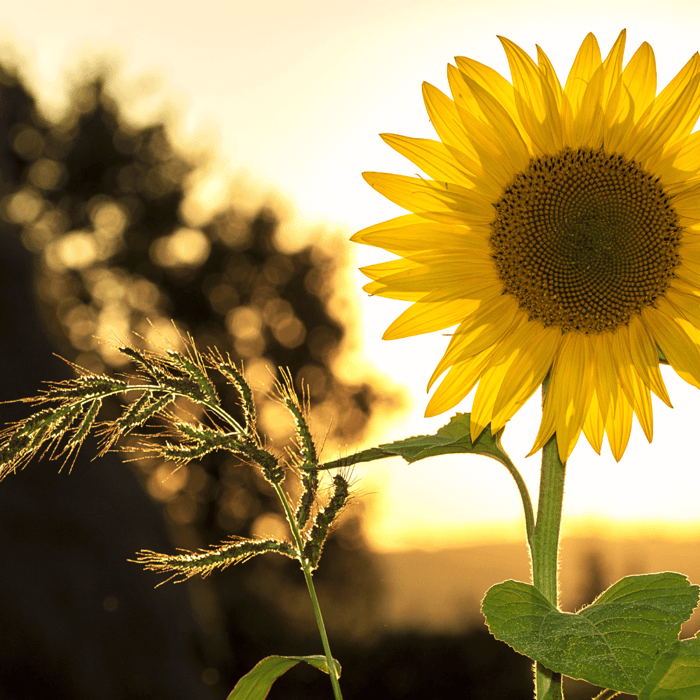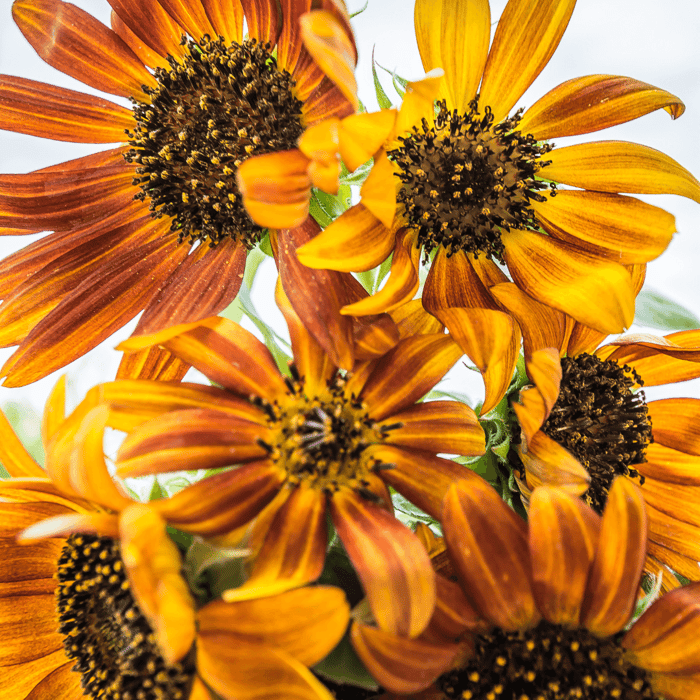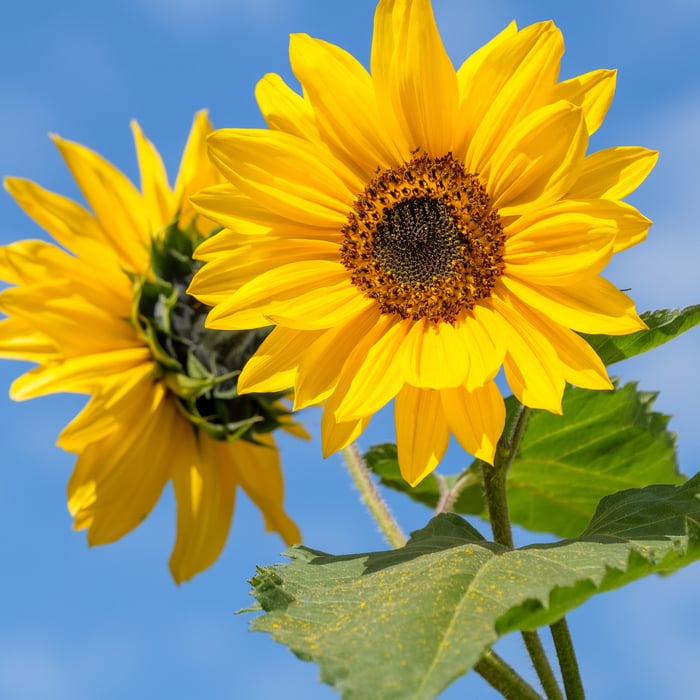Sunflowers are among the most popular flowers to grow in gardens worldwide. With their tall stems and vibrant yellow petals, they make a stunning addition to any garden or landscape. However, when it comes to planting sunflower seeds, timing is everything. Planting sunflowers at the wrong time can result in stunted growth, poor germination rates, or even complete failure. So how late can you plant sunflower seeds in your flower garden?
This is why it's important to understand the optimal timeframe for planting sunflower seeds. The ideal time for planting sunflower seeds is between April and June.
The soil is warm enough to promote proper germination and growth during this time. Additionally, the days are long enough for sunflowers to receive sufficient sunlight and develop strong stems.
If you miss this optimal timeframe for planting sunflower seeds, you'll need to make adjustments if you still want success in your garden. Late spring and early summer can still be viable options for planting sunflowers if you miss the optimal window.
However, remember that your plants may not grow as tall or produce as many blooms as they would have if planted earlier. On the other hand, planting sunflower seeds too late in the season - such as late summer or fall - can be risky business.
The colder temperatures and shorter days during this time of year are not ideal conditions for growing healthy sunflowers. While some varieties may still thrive during this period with extra care and attention given towards protection from frost or cold weather damage.
Timing is crucial for successfully growing beautiful sunflowers in your garden. It's important to understand when the optimal timeframe for planting them is to maximize your chances of success while also considering how much time you have to devote to gardening activities like watering or weeding!
Sunflower Planting Seeds | 5 Variety Pack

$9.95
Sunflower Planting Seeds For Planting - 5 Spectacular Varieties for a Sun-Kissed Garden Introducing our premium Sunflower Planting Seeds For Planting collection, featuring five stunning sunflower varieties that will bring vibrant color and unparalleled beauty to your garden. Transform your… read more
The Optimal Timeframe for Planting Sunflower Seeds
The Perfect Timing for Growing the Perfect Sunflowers
Sunflower seeds are a popular choice among gardeners and with good reason! These beautiful flowers can add a touch of sunshine to any garden or landscape.
However, timing is crucial when it comes to planting sunflower seeds. The optimal time for sunflower flower seeds is typically between April and June. Flower gardens really shine with the addition of sunflower heritage seeds added for some extra color and height.
The Temperature and Soil Conditions
The ideal temperature range for growing sunflowers is between 70°F and 78°F. During this time frame, the soil temperature ranges from 50°F to 55°F.
This temperature range allows the seeds to germinate quickly and thrive in the warm soil. Another crucial factor that affects seed germination and flower growth is soil quality.
A well-drained loamy soil with a pH level of around 6.0 to 7.5 is perfect for growing sunflowers. This soil type provides proper drainage while retaining enough moisture required by these plants without causing root rot.
Why Planting Earlier Is Better Than Later
Planting sunflowers earlier in the year also means that they will have enough time to mature before fall frost hits, which could potentially damage or kill your plants. Furthermore, if you plant your sunflowers earlier in spring or late winter, you'll likely have fewer pests problems, such as aphids or whiteflies, than those planted in summer. In addition, planting early will give your sunflowers plenty of time to establish deep root systems that will help them withstand strong winds or heavy downpours later during their blooming season.
What Happens When You Plant Sunflower Seeds Too Late?
If you missed the ideal timeframe for planting sunflower seeds by just a few weeks or months, there's still hope. However, planting sunflowers too late can have some drawbacks. For one, the soil temperature might be too hot or cold for the seeds to germinate properly.
As a result, you may experience spotty or delayed germination that can significantly affect your sunflower's growth and productivity. Additionally, sunflowers planted too late may not have enough time to develop deep root systems, which could lead to weak stems and early plant death.
Planting sunflower seeds during the optimal timeframe of April through June is essential for success. This timing ensures ideal soil temperatures and conditions that promote germination and healthy plant growth.
However, if you miss this timeframe by a few weeks or months, don't lose hope! You can still plant sunflowers later in the season with some adjustments to your gardening routine.
Planting Sunflower Seeds in Late Spring/Early Summer
The Possibility of Planting Sunflower Seeds Late
So, you missed the optimal timeframe for planting sunflower seeds. It happens. Maybe you were busy with other things or just didn't get around to it.
But now it's late spring or early summer, and you're wondering if it's still possible to plant those annual sunflowers. The answer is yes but with some caveats.
Adjusting Your Gardening Routine
First, let's be clear: planting sunflower seeds in late spring or early summer is not ideal. The optimal time for planting sunflowers is between April and June because the soil temperature is warm enough for the seeds to germinate quickly and develop strong roots. But if you're determined to plant those sunflowers anyway, there are some adjustments you can make to your gardening routine.
One option is to start your sunflower seeds indoors in pots before transplanting them outside once the weather warms up. This will give them a head start on development and help ensure they have enough time to mature before fall arrives.
Another option is to choose a variety of sunflowers with a shorter growing season or more tolerant of cooler temperatures. There are many different types of sunflowers, so do your research before choosing which ones to plant.
Sunflower Seeds For Planting | 8 Variety Pack

$15.95
8 Sunflower Seeds Variety Pack – Heirloom, Non-Hybrid, Open-Pollinated, Non-GMO Bring vibrant beauty, pollinator activity, and unique diversity to your garden with our 8 Sunflower Seeds Variety Pack! This premium collection offers an exceptional mix of heirloom sunflower seeds that… read more
Choosing the Right Location
Whether you're starting your seeds indoors or planting them directly into the ground outside, choosing the right location for your sunflowers is important. They need plenty of sunlight (at least six hours per day) and well-draining soil that isn't too compacted. If your soil isn't ideal for growing sunflowers (for example, if it's heavy clay), consider adding some organic matter, such as compost or aged manure, to help improve its texture and fertility.
Watering and Fertilizing Your Sunflowers
Once your sunflowers are planted, keeping them well-watered and fertilized throughout the growing season is important. This is especially important if you're planting them later than usual since they'll have less time to develop strong roots and take up nutrients from the soil.
Water your sunflowers deeply once a week (more often if it's hot and dry) rather than giving them frequent shallow watering. This will encourage their roots to grow deeper into the soil, making them more drought-resistant in the long run.
As for fertilizing, apply a balanced fertilizer (such as a 10-10-10 or 16-16-16 blend) every four to six weeks throughout the growing season. Avoid over-fertilizing, though, as this can lead to lush foliage but fewer flowers.
Is Late Planting Worth It?
So, can you plant sunflower seeds in late spring or early summer? Yes. Should you?
That depends on your goals as a gardener. If you're willing to put in the extra effort and make some adjustments to your routine, then go for it!
You might not get as many blooms as you would if you planted earlier in the year, but you'll still get some beautiful flowers that will brighten up your garden. However, if you're looking for a high yield of sunflowers or want them for a specific purpose (such as cut flowers), it might be best to wait until next year's planting season.
Remember: gardening is about experimentation and learning what works best for your situation. Don't be afraid to try new things!
Planting Sunflower Seeds in Late Summer/Fall
Is it Possible?
It's a question that many gardeners may ask themselves when they realize they missed the optimal timeframe for planting sunflower seeds. Can you still plant them in late summer or fall? The answer is yes but with some caveats.
While it's not recommended to plant sunflower seeds in late summer or fall due to colder temperatures and shorter days, some varieties may still thrive during this time. However, choosing these varieties carefully is important, and taking additional steps to ensure their success.
The Risks of Planting Late
When planting sunflowers late in the season, several risks must be considered. One of the main risks is colder temperatures, which can stunt growth or even kill the young seedlings.
Additionally, shorter days mean less sunlight for the plants, hindering their growth. There's also the risk of frost if planting too late in the fall.
Frost can damage or kill sunflowers, making all your hard work go to waste. Pests and diseases may be more prevalent later in the season, increasing your chances of failure.
Choosing Late-Blooming Varieties
If you're dead-set on planting sunflower seeds after the optimal timeframe, your best bet is to choose a variety that thrives in cooler weather with shorter daylight hours. One such variety is 'Autumn Beauty,' which blooms later than most varieties and has a mix of warm colors.
Another option is 'Italian White,' which produces beautiful white flowers with dark centers and doesn't need as much sunlight as other varieties. However, remember that even these late-blooming varieties will likely not reach their full potential if planted too late in the season.
Taking Extra Precautions
To increase your chances of success when planting sunflower seeds late, there are several precautions you can take. First, plant in an area with plenty of sunlight throughout the day. This will help offset the shorter days and colder temperatures.
Adding extra nutrients to the soil before planting is also a good idea, as cooler temperatures may affect nutrient uptake. Additionally, consider using frost blankets or row covers to protect the young seedlings from frost and pests.
The Final Word
While it's possible to plant sunflower seeds in late summer or fall, it's not recommended unless you take extra precautions and choose a variety that thrives in cooler weather with shorter daylight hours. Even then, success is not guaranteed.
Instead, plan for next year and aim to plant sunflower seeds within their optimal timeframe between April and June. Doing so increase your chances of a successful harvest, and enjoy beautiful blooms all season.
Wildflower, Perennial, & Annual Flower Seed Kit | 35 Variety Pack

$29.95
$49.95
35 Flower Seeds Variety Pack – Heirloom, Non-Hybrid, Non-GMO, Open-Pollinated – Perfect for Pollinator-Friendly Gardens Transform your garden with our 35 Flower Seeds Variety Pack, offering a stunning and diverse selection of heirloom, non-hybrid, and non-GMO seeds. Each variety in… read more
Tips for Planting Sunflowers Late
Choosing A Tolerant Variety
If you plan on planting sunflowers late, you must choose a variety that is more tolerant of cooler temperatures. Some sunflower varieties are bred to withstand colder temperatures. Choosing a variety that fits well with your area in terms of temperature will increase the chances of success.
When choosing a variety, research hardier varieties that can withstand temperatures below freezing. Varieties such as Dwarf Sungold, Kong, and Russian Giant have shown to be fairly tolerant and thrive even in cooler climates.
Provide Extra Protection
Sunflowers require full sun and warmth to grow properly. But if you're planting them late in the season or during cold weather, it's always wise to provide extra protection.
You could protect them from frost by covering them at night with blankets or burlap bags. This will help retain heat and keep them warm overnight when temperatures drop rapidly.
Another method of protecting your sunflower seeds is cloches or row covers made of plastic material. These covers will create a mini greenhouse effect, which helps trap heat around the plant, making it possible to thrive even in cold weather conditions.
Consider Soil Enhancement
Consider enriching the soil with compost before planting to give your sunflower seeds the best chance of growing even when planted late. This ensures they have all they need to grow healthy during their short season. Adding some aged compost can improve soil structure and provide all essential nutrients for smooth development throughout their growing period, which is critical, especially when planting late.
 Frequently Asked Questions - How Late Can You Plant Sunflower Seeds In Flower Gardens?
Frequently Asked Questions - How Late Can You Plant Sunflower Seeds In Flower Gardens?
Q1: When is the best time to plant sunflower seeds?
A: The best time to plant sunflower seeds is in the late spring after the last frost. The soil temperature should be at least 50-60°F (10-16°C) for optimal germination.
Q2: How late can I plant sunflower seeds?
A: Sunflowers can be planted as late as June in most regions. However, sunflowers need about 70 to 100 days to mature, so they must be planted early enough to flower before the first frost in the fall.
Q3: Can I plant sunflower seeds in the summer?
A: Yes, you can plant sunflower seeds in the early summer. However, the plants may not have enough time to mature and bloom if planted too late in summer.
Q4: What happens if you plant sunflower seeds too late?
A: If sunflower seeds are planted too late, the plants may not have enough time to mature and produce flowers before the first frost. This could lead to a lack of blooms or smaller, less vibrant sunflowers.
Q5: What should I do if I miss the sunflower seeds' optimal planting window?
A: If you missed the optimal planting window for sunflower seeds, you can still plant them but be prepared that they may not bloom as well. Alternatively, you could start them indoors and transplant them outside when the weather is warmer.
Q6: Can sunflowers grow in the fall or winter?
A: Sunflowers are warm-season plants and typically can't survive fall and winter cold temperatures. They need full sun and warm temperatures to germinate and grow.
Q7: How long do sunflower seeds take to germinate?
A: Sunflower seeds usually take 7 to 10 days to germinate, but this can vary depending on the variety and growing conditions.
Conclusion
While it may not be ideal to plant sunflowers late in the season due to cold weather conditions, it is still possible to follow these tips carefully. Be sure to choose a tolerant variety, provide extra protection, and enrich the soil adequately.
It is important to remember that planting sunflower seeds late will require more care and attention. They will need regular watering, fertilization, and protection from pests.
But with perseverance and attention to detail, you can still enjoy beautiful sunflowers shown in your garden, even when planting late. Remember that gardening is all about experimentation, so don't be afraid to try something new.
Who knows? You might discover new ways of growing sunflowers that work perfectly for your garden!







